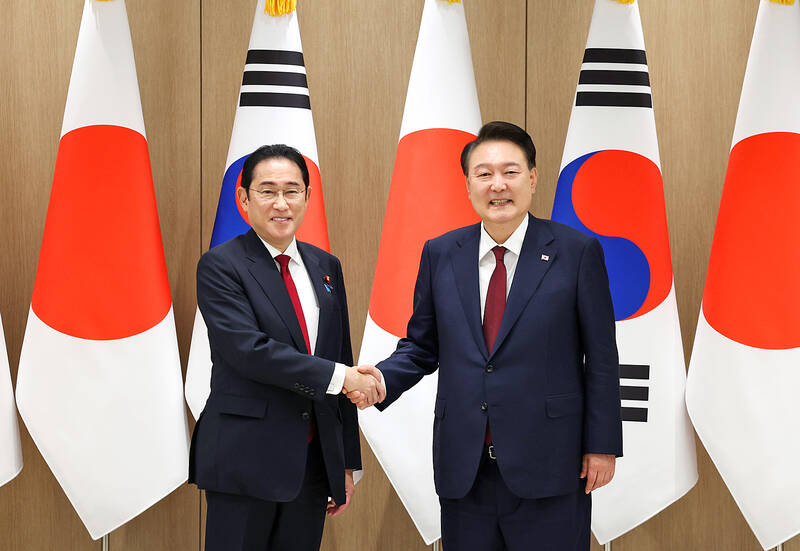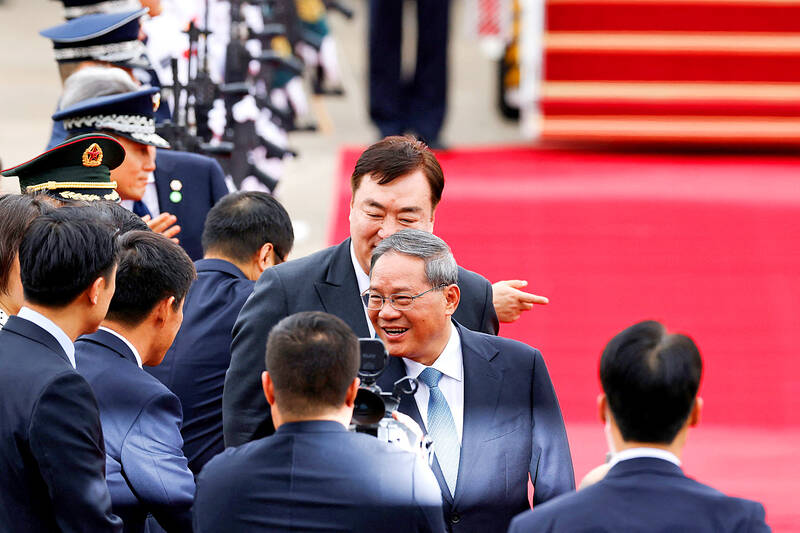South Korean and Chinese leaders yesterday agreed to start diplomatic and security dialogue and push a trade deal, when they met in Seoul ahead of a key trilateral summit with Japan.
There are low expectations of any major announcements or breakthroughs at the trilateral meeting today, but the leaders have expressed hopes it could help revitalize three-way diplomacy and ease regional tensions.
South Korean President Yoon Suk-yeol met Chinese Premier Li Qiang (李強), who is making his first visit to South Korea since taking office in March last year, and they agreed to establish a diplomatic and security dialogue and resume talks on a free-trade deal.

Photo: EPA-EFE
“China and South Korea face significant common challenges of the international affairs,” Yoon said, pointing to the wars in Ukraine and Gaza as sources of increased uncertainty in the global economy.
Yet with decades of solid ties behind them, he hoped the two countries “will continue to strengthen our cooperation amid today’s complex global crisis,” Yoon said.
Li said Beijing wanted to work with Seoul to become “a good neighbor worthy of trust on a mutual basis.”

Photo: Reuters
The two leaders discussed North Korea, which has contravened successive rounds of UN sanctions over its banned weapons programs, with Yoon telling Li he hoped China could be “a bastion of peace as a permanent member of the UN Security Council.”
Yoon, Li and Japanese Prime Minister Fumio Kishida are to hold a trilateral meeting today, the first such encounter since 2019, partly due to the COVID-19 pandemic, but also to long-strained ties between South Korea and Japan.
Yoon, who took office in 2022, has sought to bury the historical hatchet with former colonial power Japan in the face of rising threats from nuclear-armed North Korea.
Yoon also met Kishida yesterday, and said the two countries’ trust and exchanges had “dramatically increased over the past year,” pointing to booming tourism, with millions of Koreans flocking to visit Japan, and vice versa.
He said he hoped to see a “historic turning point” and a further deepening of ties next year to mark 60 years since a post-war deal normalized relations between Tokyo and Seoul.
Kishida said it was crucial that Seoul and Tokyo moved to step up cooperation “to better prepare for global issues while maintaining a free and open Indo-Pacific.”
Experts have said that due to the three countries’ starkly divergent positions on key issues including Pyongyang’s nuclear threats and growing ties with Russia, it would be hard for them to reach a consensus.
However, South Korea and Japan, which are key regional security allies of China’s archrival the US, are looking to improve trade and ease tensions with Beijing, experts say.

RESILIENCE: Deepening bilateral cooperation would extend the peace sustained over the 45 years since the Taiwan Relations Act, Greene said Taiwan-US relations are built on deep economic ties and shared values, American Institute in Taiwan (AIT) Director Raymond Greene said yesterday, adding that strengthening supply chain security in critical industries, enhancing societal resilience through cooperation and deepening partnerships are key to ensuring peace and stability for Taiwan in the years ahead. Greene made the remarks at the National Security Youth Forum, organized by National Taiwan University’s National Security and Strategy Studies Institution in Taipei. In his address in Mandarin Chinese, Greene said the Taiwan-US relationship is built on deep economic ties and shared interests, and grows stronger through the enduring friendship between

GAINING STEAM: The scheme initially failed to gather much attention, with only 188 cards issued in its first year, but gained popularity amid the COVID-19 pandemic Applications for the Employment Gold Card have increased in the past few years, with the card having been issued to a total of 13,191 people from 101 countries since its introduction in 2018, the National Development Council (NDC) said yesterday. Those who have received the card have included celebrities, such as former NBA star Dwight Howard and Australian-South Korean cheerleader Dahye Lee, the NDC said. The four-in-one Employment Gold Card combines a work permit, resident visa, Alien Resident Certificate (ARC) and re-entry permit. It was first introduced in February 2018 through the Act Governing Recruitment and Employment of Foreign Professionals (外國專業人才延攬及雇用法),

The Ministry of Transportation and Communications yesterday said that it would redesign the written portion of the driver’s license exam to make it more rigorous. “We hope that the exam can assess drivers’ understanding of traffic rules, particularly those who take the driver’s license test for the first time. In the past, drivers only needed to cram a book of test questions to pass the written exam,” Minister of Transportation and Communications Chen Shih-kai (陳世凱) told a news conference at the Taoyuan Motor Vehicle Office. “In the future, they would not be able to pass the test unless they study traffic regulations

EUROPEAN TARGETS: The planned Munich center would support TSMC’s European customers to design high-performance, energy-efficient chips, an executive said Taiwan Semiconductor Manufacturing Co (TSMC, 台積電), the world’s largest contract chipmaker, yesterday said that it plans to launch a new research-and-development (R&D) center in Munich, Germany, next quarter to assist customers with chip design. TSMC Europe president Paul de Bot made the announcement during a technology symposium in Amsterdam on Tuesday, the chipmaker said. The new Munich center would be the firm’s first chip designing center in Europe, it said. The chipmaker has set up a major R&D center at its base of operations in Hsinchu and plans to create a new one in the US to provide services for major US customers,